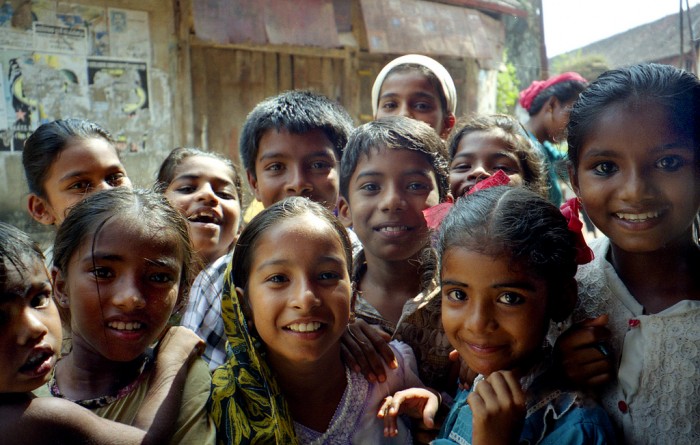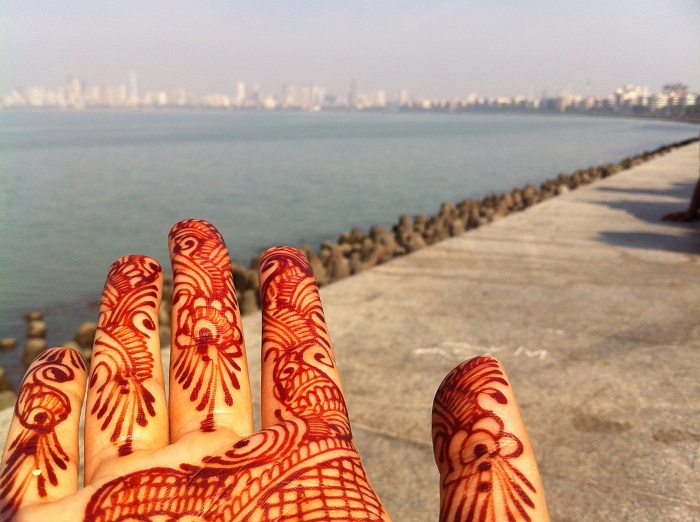I can still remember my first real trip to India.
Dozens of children swarmed the windows of our taxi with plastic butterfly hair clips, dinner towels, napkins, oranges, earrings, bracelets—everything and anything someone may leave the house for.
I was confused and overwhelmed by the commotion and loudness that was Bombay, and as I looked over to my mum for an answer, she quickly rolled up the windows.
But it didn’t stop my questions.
I wondered why the carrots were red, why I couldn’t drink fresh milk or have a glass of water from the tap.
I hated the way everyone stared at me strangely when I walked down the streets and when I spoke English. I didn’t understand where I fit in, and so, I wrote. At the tender age of 13 when nothing else made sense I turned to my journal, and 12 years later as I sit in Delhi after living here for five months I am still writing.
Ironically, this country intimidates me more now than ever before. The version of India that I knew, the one my parents built for me at home coupled with the memories of that one short visit for my cousins wedding is so far from the one I’ve experienced living here.
In my first month while I endured episode one of the dreaded diarrhea curse (which would also mark the beginning of multiple illnesses), I started to question what made me come to India on a whim. Before leaving, all I knew was that I had been manifesting this dream to come live and travel extensively within the country for the last seven years and the desire was strong enough to make me leave behind all the wonderful things and people I frequently dreamt of returning to in my many moments of sickness and solitude.
The sheer manifestation of the desire was rather peculiar considering that before choosing to live here I had only visited twice; as an infant and a preteen, neither time was a walk in the park. As I lay in bed miserable, I began to wonder whether I had made the right decision to leave and if this slow decline of my health was a sign to return home or the universe’s way of testing me to see how badly I wanted this dream.
I’ve been fighting for so many years, unconsciously trying to repress emotional baggage I didn’t even know I was carrying from the 6th grade. It was the boy who sat across me in class and called me a ‘paki’ that started it all.
I remember that disgusted look he had on his face, like it was a dirty thing to be a paki, like I was a dirty thing. I should have stood up to him but I felt ashamed. I was ashamed of my big bushy eyebrows, the dark thick hair that grew on too many parts of my body, the way my hips curved outwards, the way I tanned to a rusty brown in the summer. I often wondered why I didn’t look like my entourage of Asian friends who by comparison looked like angels to me: I envied them for being what I perceived as normal.
Although I grew up in a household with the strict rules and routines of any average Indian immigrant family in North America, I often pretended I was an outsider, like I didn’t know anything about this ‘Indian’ thing, that I couldn’t speak my language if someone asked me.
For years I praised the tortilla and rejected the rotli. I dyed and chopped off all my hair so I couldn’t make the long iconic braid. I removed my nose ring and replaced it with an eyebrow ring. I insisted for two decades that unlike other Indians who live in Canada I was different because my parents weren’t born or raised in India, and my last name was not an identifiable segment of the Indian population.
But sometimes I embraced my Indian. I took pride in the fact that I was brought up on a strict schedule of Gujarati food. That I learnt to tie my gungru in three perfect rows every Saturday morning for 6 years before my Kathak class; that I loved the way the dark kajol I wore beneath my eyes made me feel mysterious; that I couldn’t wait for my birthday every year because it meant warm, sweet, fresh, gulab jamuns made by my mum.
That the best part of summer was slurping mangoes with my hands in a way that left a dark orange ring around my mouth, and that I entered a daydream coma every time I watched SRK’s latest romance flick.
I constantly battled with myself about whether to embrace or resent my roots. I switched on my Indian light, but even then dimly, when it was in my favour, and quickly switched it off when it not longer suited my purpose.
I never realized that this internal conflict existed until I found myself strolling down the streets of Delhi as a young adult, my oversized glasses glued to my face, in attempt to disguise myself as an outsider. I knew then that this was the reason I had come, and this was the reason I would stay and overcome all the obstacles along my way.
My first week in Delhi as I sat in a trendy little cafe sipping on a lassi in Delhi’s Hauz Kas Village, I stumbled upon a book called Maximum City. Intrigued by the cover, I began to flip through it, only to quickly learn that the Indian-born, New York based author Suketu Mehta was highly acclaimed by every South Asian fiction writer I had ever known and adored. Instinctively I began to read it, and twenty pages in I was fascinated.
The novel delved into the many conflicts Mehta faced while having to move to America as a pre-teen Indian bred boy, learning to fit in, and then again while moving back to India as an American bred adult, learning to roll with the Indians. Amongst all the compelling things he revealed, it was one line in particular that stayed with me throughout my own journey in India, in which he said:
“India is the country of No. That ‘no’ is your test. You have to get past it. It is India’s Great Wall; it keeps out foreign invaders. Pursuing it energetically and vanquishing it is your challenge….India is not a tourist friendly country. It will reveal itself to you only if you stay against all odds. The ‘no’ might never become a ‘yes’. But you will stop asking questions.” ~ Suketu Mehta, Maximum City
Although I expected this journey to be challenging, I never could have mentally prepared myself enough for all the things I observed in the last six months. After two injured ankles, countless episodes of diarrhea, several hospital visits, bags full of obscure pills, injections, head lice, trains, buses, planes, boats, scooters, autos and too many indecent proposals, its almost a miracle I made it back home in one piece.
I’ve cried out of fear, anger and frustration about the injustices I faced one too many times, and I constantly battled with myself on how to make amends for the things I witnessed and experienced but wished I hadn’t had to.
I grappled with how to accept the reality that inside my dream there was a nasty truth: that both living and travelling in India as a female from a Western country, on a budget and with minimal Hindi speaking skills, is no walk in the park.
It takes patience, understanding, and above all incredibly thick skin to overcome the things you see and feel on a daily basis. But even then, with the mental preparation, it often just implies that as a result of being a part of this demographic, limitations and compromises must be made about where you can go, what you can do and when it can be done, and this is the only way to survive the country.
Truthfully, I’ve come to accept that India is a country I simultaneously love and resent. I resent it for being backwards in so many ways, yet I love it for its beauty, diversity, and courage. Although it isn’t anywhere near to perfect; it often smells of the garbage that fills the streets, disease is rampant and unfortunately the media reports are not magnified, it is emerging to something better. Perhaps slowly, but I do believe that in my lifetime I will be able to say its a country I love in its entirety and one which I hope to be able to fully conquer one day, even on my own if I choose to.
Despite the many challenges I encountered on this quarter life adventure, I don’t regret my impulsive decision to leave behind my life for a second. It was a dream I had wanted to accomplish for many years and I am happy to be able to say against all odds I didn’t give up on it.
Admittedly the journey wasn’t the way I expected it would be at all, but it introduced me to some of the most fascinating people who not only piqued my curiosity over and over again, but surprised me with a kind of graciousness I’ve never experienced in my life. It taught me more than I could have ever imagined about myself. Most importantly, in a strange way, it saved me. I finally came to see that this identity I have, being Indian, is so much more than just a birth right, its a privilege. One which I am proud to say I’ve earned, one which I’ll never question or deny again, and one which realizing has allowed me to fully love myself.
After returning from South America last year and successfully travelling solo for the first time, I had talked about how the experience made me feel closer to the fearless woman I hoped to be one day, and now at my return from India, I finally feel like I am the fearless woman I dreamed of being.
Love elephant and want to go steady?
Sign up for our (curated) daily and weekly newsletters!
Editor: Renée Picard
Photo: ruffin_ready at Flickr / Sonal Batavia
 Share on bsky
Share on bsky







Read 2 comments and reply